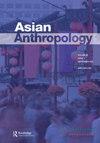Who owns a cuisine? The grassroots politics of Japanese food in Europe
Q2 Social Sciences
引用次数: 1
Abstract
Abstract Culinary borrowings are so common as to seem trivial, and yet they are consequential for many of the actors concerned. People’s livelihoods, professional status, and social identity may be tied to their stake in the defining boundaries of culinary cultures. When dominant groups or powerful actors such as multinational corporate chains adopt or reinvent the cuisine of weaker and marginal groups, it may be regarded as cultural appropriation. However, the definition of the situation becomes more complicated when multiple weak and marginal actors compete over ownership of a cuisine. This article discusses how Japanese and other Asian migrant actors participate in grassroots culinary politics surrounding definitions and uses of Japanese cuisine in the context of a Japanese food boom in Europe. It shows how the “borrowed power” of one migrant group may threaten the status and even livelihoods of the foundational stakeholders in a culinary field.谁拥有一种美食?日本料理在欧洲的草根政治
抽象的烹饪借用是如此普遍,以至于看起来微不足道,但它们对许多相关演员来说都是重要的。人们的生计、职业地位和社会身份可能与他们在定义烹饪文化边界方面的利益有关。当主导群体或强大的行动者(如跨国连锁企业)采用或重新发明弱势群体和边缘群体的烹饪方式时,这可能被视为文化挪用。然而,当多个弱势和边缘参与者争夺烹饪的所有权时,情况的定义变得更加复杂。本文讨论了日本和其他亚洲移民如何参与围绕日本料理的定义和使用的基层烹饪政治,背景是日本料理在欧洲的繁荣。它展示了一个移民群体的“借来的力量”如何威胁到烹饪领域基础利益相关者的地位甚至生计。
本文章由计算机程序翻译,如有差异,请以英文原文为准。
求助全文
约1分钟内获得全文
求助全文
来源期刊

Asian anthropology
Social Sciences-Anthropology
CiteScore
1.60
自引率
0.00%
发文量
25
期刊介绍:
Asian Anthropology seeks to bring interesting and exciting new anthropological research on Asia to a global audience. Until recently, anthropologists writing on a range of Asian topics in English but seeking a global audience have had to depend largely on Western-based journals to publish their works. Given the increasing number of indigenous anthropologists and anthropologists based in Asia, as well as the increasing interest in Asia among anthropologists everywhere, it is important to have an anthropology journal that is refereed on a global basis but that is editorially Asian-based. Asian Anthropology is editorially based in Hong Kong, Taiwan, and Japan, but welcomes contributions from anthropologists and anthropology-related scholars throughout the world with an interest in Asia, especially East Asia as well as Southeast and South Asia. While the language of the journal is English, we also seek original works translated into English, which will facilitate greater participation and scholarly exchange. The journal will provide a forum for anthropologists working on Asia, in the broadest sense of the term "Asia". We seek your general support through submissions, subscriptions, and comments.
 求助内容:
求助内容: 应助结果提醒方式:
应助结果提醒方式:


